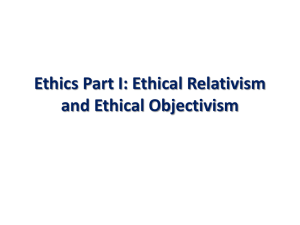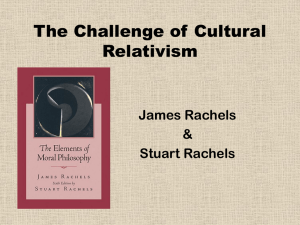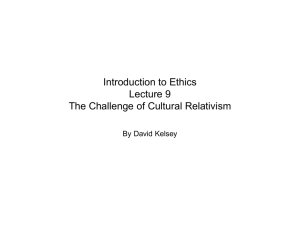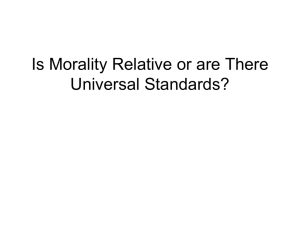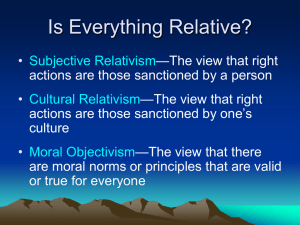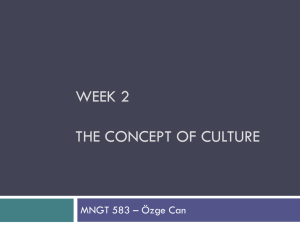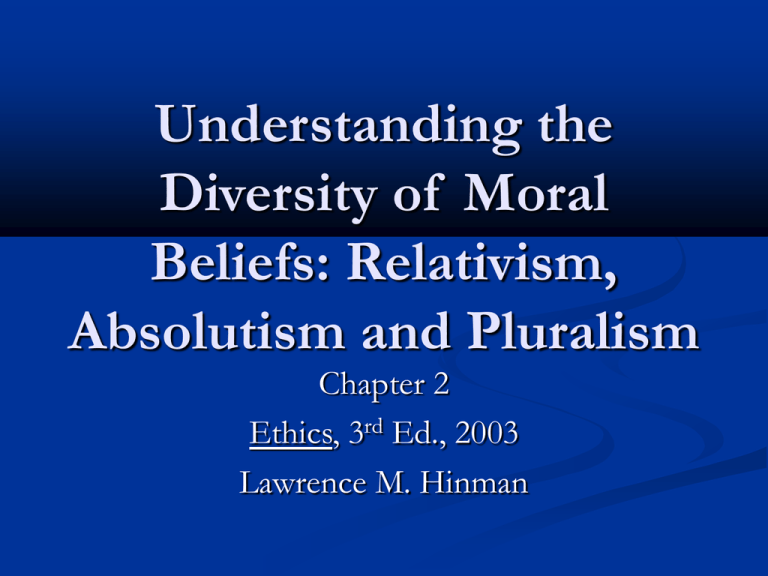
Understanding the
Diversity of Moral
Beliefs: Relativism,
Absolutism and Pluralism
Chapter 2
Ethics, 3rd Ed., 2003
Lawrence M. Hinman
What is culture clash?
What happens when two cultures clash?
Examples of culture clash..
Three approaches
Ethical absolutists...there is a single standard in terms
of assessments that can be made, and that standard is
usually their own
Ethical relativists see each culture as an island unto
itself, right in its own world and they deny there is any
overarching standard in terms of which conflicting
culture can be judged
Ethical pluralists acknowledge that cultures can
legitimately pass judgments on one another and
encourages us to listen to what other cultures say about
us as well as what we say about them
Purpose of the chapter
Looking at three possible responses to moral
conflicts (relativism, absolutism, and pluralism),
assessing their respective merits and see how are
applied in actual cases.
Two levels of moral conflict
Concrete conflicts
Clitoridectomies (female circumcision; female genital
mutilation)
Forced marriage of underage girls
What happens when something that is legally and
morally permissible in one culture is illegal and
immoral in another?
Ethical relativist—Each culture is right unto
itself, so such practices would be morally
permissible in some countries and morally
wrong in the US
Ethical absolutists—there is a single moral truth
in terms of which all cultures and individuals are
to be judged
Pluralists try to find some middle ground (in
some situations this practice may make sense,
less judgmental
These three ethical positions provide a rich
context for understanding the variation of all
ethical theories that Hinman discusses
Divine command —we ought to do whatever
God wills
Issue is whose God? and does God speak
differently to each of us? or do we interpret the
messages differently?
Egoism—each person should act selfishly to
maximize self interest
Utilitarian– Should act in such a way as to
produce the greatest overall amount of pleasure
or happiness
Kantian ethics —Act in ways that respect the
autonomy and dignity of ourselves and others
persons
Rights theorists —content that there is a certain
universal moral minimum with which all people
must comply
Fundamental Intuitions of Ethical Pluralism
Principle of
Principle of
Principle of
Principle of
understanding
Tolerance
standing up against evil
fallibility
How different cultures have
different moral codes
Different cultures have different moral codes.
What is right within one group maybe abhorrent
to another
Treatment of the dead
Polygamy
Sharing of wives among Eskimos
Infanticide
Exercise:
Provide 5 examples of differing moral codes,
customs, or behaviors…
Tell us what makes them unique, odd or
different
What is our reaction to such
“Strange or different” customs?
Label them as backward, uneducated or natives
Primitive
Heathens
Non-Christians
Poke fun of them…discriminate or harass
Convert them to “our” custom or thought
Cultural Relativism
What are some examples of Cultural Relativism?
Hasidic Jews in Postville
Amish lifestyles
Religious traditions—baptisms, communion services
Celebrations—Santa Claus, Easter Bunny, Halloween
Parties: when, where and how
Issues of privacy
Housing style
Personal hygiene
Role of children
William Graham Sumner
“The right way” is the way which the ancestors used
and which has been handed down. The tradition is its
own warrant. It is not held subject to verification by
experience. The notion of right is in the folkways. ….”
This line of thought has probably persuaded more
people to be skeptical about ethics than any other single
statement.
“If we assume that our ethical ideas will be shared
by all people at all times, we are merely naïve”
Provide examples where ethical ideas in our
society may have changed over the years?
Examples where ethical/moral ideas have changed over the years
Divorce, Living together, Mixed race marriages, Allowing same sex marriages
Gambling, casinos, internet poker
Internet dating
Women in the workforce, women operating farm equipment, firewomen,
truck drivers
Spanking/punishment of children
Acceptance of cremation for the dead
Competition vs cooperation in farming, relying on neighbors help vs
outbidding the neighbor
Animal welfare, recognizing that animals have certain rights
Natural resource protection
Taming “mother nature” vs “living with nature”
Cultural Relativism
“Different cultures have different moral codes” often is
used as a key to understanding morality. Proponents
argue that there is not as universal truth in ethics; there
are only the various cultural codes and nothing more.
The customs of different societies is all that exist.
Proponents would argue that customs can not be
judged as correct or incorrect.
Our own code of ethics has no special status, it is
merely one among many
Cultural relativism
Challenges our ordinary belief in the objectivity
and universality of moral truths.
It says in effect that there is no such thing as a
universal truth in ethics, there are only cultural
codes and nothing more
Your own code of ethics offers nothing special,
it is merely one among many
Claims of Cultural Relativists
1.
2.
3.
4.
5.
6.
Different societies have different moral codes
The moral code of a society determines what is
right within that society
There is no objective standard that can be used
to judge one societies code as better than another
The moral code of our society offers nothing
special
There is no universal truth in ethics…
It is arrogant to judge the conduct of other
societies, we should adopt an attitude of
tolerance
The Cultural Differences Argument
Is a theory about the nature of morality
At the heart of the Cultural Relativism is the form
of their argument. They argue from facts
about differences between cultural outlooks to
making conclusions about the status of
morality
For example:
Premises:
1.
Different cultures have different moral codes
2.
Therefore, there are no objective truth in morality.
Right and wrong are only matters of opinion, and
opinions vary from culture to culture.
This is cultural differences argument.
The Unsoundness of the Cultural
Differences Argument
The trouble is that the conclusion does not follow from the
premise—that is even if the premise is true, the
conclusion might be false.
WHY? The premise concerns what people believe; some
believe one way and others believe another but the
conclusion concerns what really is the case
An example;
The Greeks believed it was wrong to eat the dead. The
Callatians believed it was right. Does it follow, from the
mere fact that they disagreed, that there is no objective truth in the
matter?
No it does not follow—it could be objectively right or wrong that one
or the other was simply mistaken.
Another example:
Society “A” believes the world is flat and Society “B”
believes the world to be round.
Just because these two societies disagree, there is objective
truth about the shape of the earth.
We can verify that members of the flat earth society are
simply mistaken, uneducated or failed geography in
middle school.
The Fatal Flaw of the Cultural
Difference Argument
It attempts to derive a substantive conclusion about a
subject from the mere fact that people disagree about it.
Caution: This is a simple point of logic. We are not necessarily
stating that the conclusion is false, the logic is that the conclusion
does not follow from the premise.
The Consequences of Accepting
Cultural Relativism
1. We could no longer say that custom of other societies
are morally inferior to others. (This is one of the
main points of Cultural Relativism)
We would have to stop condemning other societies merely
because they are different.
Tolerance towards slavery, anti Semitism, hatred towards
ethnic groups, or minorities, kiddy porn, sex slave
trade---if we took the cultural relativism seriously we
would have to regard these behaviors as immune
from criticism
If we accept Cultural Relativism
2. We could decide whether actions are right or wrong just
by consulting the standards of our society.
In Colonial America slavery was OK, women were not
allowed to vote or own property, primogeniture was
practiced, etc and therefore these things were right.
This position requires that we accept moral codes as proper and
can not be improved.
If we accept Cultural Relativism
3. The idea of moral progress is called into doubt
Progress implies doing things better, but cultural
relativism rejects making judgments about past eras.
Reform movements such as rights to women and minorities that
implies modern society is better is a judgment that is impossible to
make.
As a result, most thinkers reject the cultural relativism
arguments.
1.
It makes sense to condemn some practices wherever
they occur
2.
It makes sense to acknowledge that our society while
imperfect has made moral progress
3.
Because Cultural Relativism implies these judgments
make no sense, the argument goes, it cannot be right.
There is less disagreement than it seems
There are differences across societies but the
differences are often over-stated
Need to explore not particular practices or values
but the belief systems that lie behind the
practices.
The differences are often in the belief system.
Source of Customs
Beliefs—religious beliefs
Physical circumstances of the society
Just because customs differ, there may be less
disagreement on basic values
Example: Eskimos infanticide
“drastic measures are sometimes needed to ensure the family’s
survival” The Eskimos values are not all that different than our
own..It is only that life forces upon them choices that we do not
have to make”
What are some other customs that
differ from our own?
Marriage vows
Church attendance
Neighboring
Role of women
Burial and funerals
Eating habits
Rites of passage of children becoming adults
Universal Values in Societies
1.
2.
3.
Value of protecting the young
Truth telling
Prohibition of murder
“There are some moral rules that all societies must have in
common, because those rules are necessary for society to
exist.”
What other universal values or moral
rules can you think of ?
Prohibition against incest
Personal responsibility
The proper role of government is to take care
of its citizens
Everyone should serve their country
Everyone should obey the law
Judging a cultural practice to be undesirable
Ex. In 1996 a 17 year old girl from Togo a West African
country arrived in the US and asked for asylum to avoid
“ excision”, a practice referred to as “female
circumcision” or “female genital mutilation”. According
to the WHO, the practice is widespread in 26 African
countries and 2 million girls are excised each year.
Reaction in the New York Times, encouraged the idea that
excision was a barbaric practice and should be condemned.
Young girls often look forward to this because it a
acceptance into adulthood. It is an accepted practice
in many villages.
Consequences of excision
painful, results in permanent loss of sexual pleasure,
hemorrhage, tetanus, septicemia, death, chronic
infections, hinder walking, chronic pain
Apparent no social benefits, not a matter of religious
beliefs
Rationale for the practice
Women are incapable of sexual pleasure and
less likely to be promiscuous
Fewer unwanted pregnancies in unmarried
women
Women will be more faithful to their husbands
Un-excised women are viewed as unclean and
immature
Arguments for this practice is that it benefits
men, women, families and children
Is excision, harmful or helpful?
Cultural Relativist would conclude that
excision has been practiced for
centuries and we should not intervene
and change ancient ways.
We may ask whether a practice promotes or hinders the
welfare of the people who lives are affected by it. And as
a corollary, Is there an alternative set of social
arrangements that would do a better job of promoting
their welfare. If so, we may conclude that the existing
practice is deficient.
Reluctance to Criticize
Many thoughtful people have been
reluctant to criticize what many view as a
barbaric practice because:
1. Interfering with the social customs of other
people. (Europeans and Americans have
been criticized for destroying other
cultures, Native Americans)
2. Acceptance of strange practices (tolerance)
toward others.
3. Reluctance to criticize other societies, do not
want to express contempt
Lessons From Cultural Relativism
1.
2.
3.
Rests on invalid argument
Although it enjoys much appeal
Two important lessons
1.
Warns us about the dangers of assuming that our
preferences are based upon some absolute rational
standard. They are not. Many of our practices are
merely particular to our society and it is easy to
forget this.
There are many matters that we tend to
think of in terms of objective right or
wrong, that are really nothing more
than social conventions.
Other examples of social conventions that we think of as “right”
or “wrong” that are really nothing more than social conventions.
Women covering their breasts,
separate restrooms for men and women,
men opening the door for women,
No shoes, no shirt, no service
Dear _________
fathers giving their daughters away in wedding
ceremony,
wearing a wedding band on the fourth finger of the left
hand,
swearing, drinking, gambling, etc
2. Keep an open mind—
Maybe our feelings about practices, values and
beliefs are merely social conventions—example
homosexuality. Maybe our feelings are not
necessarily perceptions of the truth…they may
be nothing more than cultural conditioning
There is a certain appeal to cultural relativism,
but there are some major shortcomings to the
the theory. Many of the practices and
attitudes that we think as natural law are really
only cultural products. Need to keep this in
mind if we are to avoid being arrogant and
have open minds

